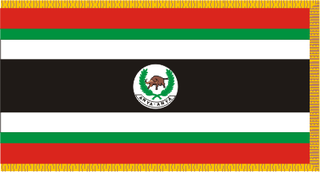
Sudan, officially the Republic of the Sudan, is a country in Northeast Africa. It borders the Central African Republic to the southwest, Chad to the west, Libya to the northwest, Egypt to the north, the Red Sea to the east, Eritrea and Ethiopia to the southeast, and South Sudan to the south. Sudan has a population of 50 million people as of 2024 and occupies 1,886,068 square kilometres, making it Africa's third-largest country by area and the third-largest by area in the Arab League. It was the largest country by area in Africa and the Arab League until the secession of South Sudan in 2011; since then both titles have been held by Algeria. Sudan's capital and most populous city is Khartoum.

The rich and varied music of Sudan has traditional, rural, northeastern African roots and also shows Arabic, Western or other African influences, especially on the popular urban music from the early 20th century onwards. Since the establishment of big cities like Khartoum as melting pots for people of diverse backgrounds, their cultural heritage and tastes have shaped numerous forms of modern popular music. In the globalized world of today, the creation and consumption of music through satellite TV or on the Internet is a driving force for cultural change in Sudan, popular with local audiences as well as with Sudanese living abroad.

Gaafar Muhammad an-Nimeiry was a Sudanese military officer and politician who served as the fourth head of state of Sudan from 1969 to 1985, first as Chairman of the National Revolutionary Command Council and then as President.

The Second Sudanese Civil War was a conflict from 1983 to 2005 between the central Sudanese government and the Sudan People's Liberation Army. It was largely a continuation of the First Sudanese Civil War of 1955 to 1972. Although it originated in southern Sudan, the civil war spread to the Nuba mountains and the Blue Nile. It lasted for almost 22 years and is one of the longest civil wars on record. The war resulted in the independence of South Sudan 6 years after the war ended.

Juma Abdalla Oris was a Ugandan military officer and government minister during the dictatorship of Idi Amin. After fleeing his country during the Uganda–Tanzania War, he became leader of the West Nile Bank Front (WNBF), a rebel group active in the West Nile region of Uganda during the 1990s.

The First Sudanese Civil War was fought from 1955 to 1972 between the northern part of Sudan and the southern Sudan region which demanded representation and more regional autonomy. The war was divided into four major stages: initial guerrilla warfare, the creation of the Anyanya insurgency, political strife within the government, and establishment of the South Sudan Liberation Movement. Around a million people died over the course of the nearly 17-year long war.

The Anyanya were a southern Sudanese separatist rebel army formed during the First Sudanese Civil War (1955–1972). A separate movement that rose during the Second Sudanese Civil War were, in turn, called Anyanya II. Anyanya means "snake venom" in the Ma'di language.

The Sudanese Communist Party is a communist party in Sudan. Founded in 1946, it was a major force in Sudanese politics in the early post-independence years, and was one of the two most influential communist parties in the Arab world, the other being the Iraqi Communist Party.

Betty Achan Ogwaro is a South Sudanese politician in the government of South Sudan. Betty Achan Ogwaro was the former and the first minister of Agriculture and Forestry in the Republic of South Sudan
Fatima Abdel Mahmoud was a Sudanese politician, leader of the Sudanese Socialist Democratic Union. In 1973 she was one of the first women to hold political office in Sudan, and she took part in the April 2010 Sudanese general election as the country's first female presidential candidate.
Agnes Kwaje Lasuba is a South Sudanese politician.
Victoria Yar Arol was a Sudanese politician. The first woman from Southern Sudan to study at the University of Khartoum she was later a politician with seats on the regional assembly for Bahr el Ghazal Province and the National Peoples Assembly of Sudan.

The Sudanese revolution was a major shift of political power in Sudan that started with street protests throughout Sudan on 19 December 2018 and continued with sustained civil disobedience for about eight months, during which the 2019 Sudanese coup d'état deposed President Omar al-Bashir on 11 April after thirty years in power, 3 June Khartoum massacre took place under the leadership of the Transitional Military Council (TMC) that replaced al-Bashir, and in July and August 2019 the TMC and the Forces of Freedom and Change alliance (FFC) signed a Political Agreement and a Draft Constitutional Declaration legally defining a planned 39-month phase of transitional state institutions and procedures to return Sudan to a civilian democracy.
Aisha Musa el-Said is a Sudanese translator and politician who served as a member of the Sovereignty Council of Sudan, the country's collective head of state, between August 2019 and May 2021. Musa was one of six civilians to hold seats in the 11-member transitional government council, which took power following the Sudanese Revolution; the remaining five members were nominated by the Sudanese military. Musa and fellow Sovereignty Council member Raja Nicola are the first two women in modern Sudanese history to hold the role of a head of state. Musa is known as a women's rights activist and for advocating for improved, fairer and more decentralized education, and for the practical application of acquired knowledge in Sudan.
The Sudanese Women's Union is a Sudanese women's rights organisation that is one of the biggest post-independence women's rights organisations in Africa.
Fatima Talib is a Sudanese educator and women's rights activist who convened the first women-only organisation in Sudan.
Amna Elsadik Badri is a Sudanese academic, writer, and activist, focusing on women's education in Sudan. She is the vice president for academic affairs at Ahfad University for Women, the first women's college in the country, where she has taught since 1973.
Omnia Shawkat is a Sudanese journalist, digital stories and cross-cultural curator. She is co-founder and manager of the cultural online platform Andariya, based in Sudan, South Sudan and Uganda, covering other countries in East Africa and the Horn of Africa as well.

Mariam al-Sadiq al-Mahdi is a Sudanese politician, the leader of the National Umma Party, and the Sudanese Minister of Foreign Affairs from 11 February 2021 until her resignation on 22 November 2021. She is the daughter of Sadiq al-Mahdi, an opposition leader and former Prime Minister of Sudan, and a member of the central body of the party.
Dorothy Griselda El TayibMBE was a British-born visual artist and cultural anthropologist, who was mainly known for her pioneering research on the traditional costumes as they reflect the culture and society of Sudan since the 1970s. She published her research in 2017 in the illustrated book Regional Folk Costumes of the Sudan.











